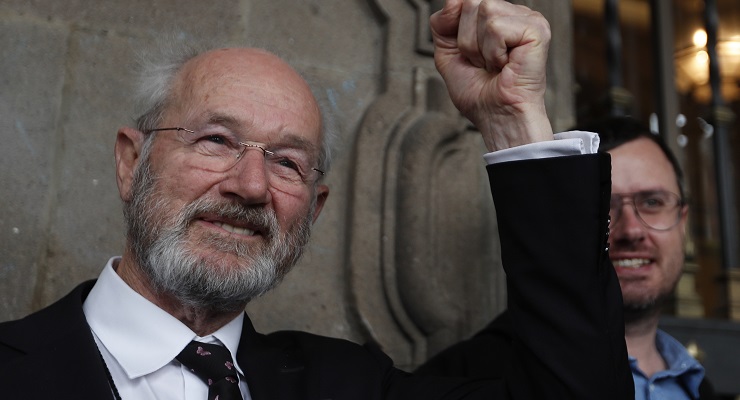
Julian Assange’s family is feeling cautiously optimistic about the appointment of Kevin Rudd a Australia’s US ambassador. Rudd has vocally supported the jailed Wikileaks founder despite being humiliated by some of the material he published.
“[I’m] encouraged by the appointment, for sure,” Assange’s brother Gabriel Shipton told Crikey.
Rudd, who starts his new job in Washington early next year, declined to comment on Assange’s case when contacted by Crikey. But his office said his personal views on the matter were summed up in a 2019 letter he wrote to an activist lobbying on Assange’s behalf.
Rudd wrote that he couldn’t see how anyone had been seriously harmed by the information shared by Assange, that it was difficult to say what separated Assange from a journalist publishing secret information, and that the responsibility for keeping information secure rested with governments.
“An effective life sentence is an unacceptable and disproportionate price to pay,” he wrote. “I would therefore oppose his extradition.”
Shipton agreed: “Kevin’s statement is good, particularly on the points that say it is up to the state to secure their secrets and if they can’t it’s their failure.
“Generally his views are in line with most Australians. The hypocrisy of Julian’s persecution — when you have the American whistleblower who leaked this information receiving a commuted sentence and being free since 2017, but the Australian who published the information has been arbitrarily detained for 12 years.”
Assange’s father John Shipton was also positive about Rudd’s appointment: “Kevin Rudd is, from my view, a vigorous, experienced and skilled diplomat. Ambassador Rudd is without doubt fully aware of his prime minister’s public position on Julian’s dire circumstances.”
Rudd’s views clear in 2019 letter
Rudd’s 2019 letter was addressed to an activist connected with a Queensland event dubbed “Bring Julian Assange Home”. He wrote to decline an invitation to attend the rally and to explain his position.
He wrote that he, as a former prime minister, was “deeply opposed” to any leaking of classified information and acknowledged the leaking of diplomatic cables to Wikileaks had “caused me some political discomfort at the time”.
“While I hold serious reservations about Mr Assange’s character and his conduct, I nonetheless share some of the concerns that have been raised about his potential extradition to face an effective life sentence, or worse, in the US,” Rudd wrote.
“Judging from the indictment … US prosecutors appear to have levelled no specific allegation that anyone came to serious harm as a consequence of these leaks. If their case is essentially that Mr Assange broke the law by obtaining and disclosing secret information, then I struggle to see what separates him from any journalist who solicits, obtains and publishes such information.”
Assange posted embarrassing info on Rudd
Rudd’s first time as prime minister ended just months before Assange became the subject of a Swedish arrest warrant for alleged rape, which he denied. That same year, Wikileaks began publishing troves of diplomatic correspondence that caused global political shockwaves.
The documents included a brief on a 75-minute lunch Rudd had with then US secretary of state Hillary Clinton, where Rudd gave frank assessments on Australia’s relationship with China and about Beijing’s view of Taiwan and Tibet.
They also included documents that were embarrassing for Rudd, such as a US embassy briefing that said American officials believed he was a “control freak” who wasn’t able to handle foreign affairs properly despite a view of himself as experienced and intellectual.
Assange fights extradition
By the time Rudd was briefly in the Lodge again, in 2013, Assange was holing up in the Ecuadorian embassy in London to avoid extradition to Sweden.
The Swedish rape case was eventually scrapped in 2019 after the Swedish prosecution authority deemed that although the complainant had “submitted a credible and reliable version of events … the evidence has weakened considerably due to the long period of time that [had] elapsed” since the alleged 2010 incident.
Assange was removed from the embassy and detained by UK police in 2019, and has been behind bars ever since. He faces 18 US counts, including a spying allegation. His legal team is seeking to appeal a UK government decision to allow his extradition to the US.
Rudd has tweeted about Assange a handful of times in the past two years, including in June this year, when he called the decision of the UK home secretary to allow the extradition “total hypocrisy”.








That for me is the crux of the matter. Even without the content of the leak.
During Assange’s incarceration to date Australia has had lightweight ambassadors taking up space in Washington. They were of no value to his cause, uninterested in his predicament & I’m guessing they never raised his case with the US government. We know Albanese has spoken to Biden about Assange’s release, Kevin Rudd can build on that.
Bringing Assange home to Australia would be a major achievement for Albanese/Rudd & ensure favourable mention in our history books.
I see no donors.
Well I have been a lifelong supporter of Assange and have signed numerous petitions on his behalf. I would gladly accept help from anyone on this, even Kevin07, and I would gladly wear egg on my face if Assange is released due to the efforts of former PM, Rudd. Assange is too important a case not to take up. I couldn’t care how offended the US by this. His leaker in chief, Chelsea Manning, is free. Assange had a platform that made the US look bad in the eyes of the world. A cardinal sin. And because Assange is not a US citizen, he is fair game, especially from a compliant and gutless and conservative Australian government.
I hope Rudd raises this issue constructively and realises the importance of the role he is playing in Assange’s case and his future and focuses on that.
How does UE jurisdiction extend to actions taking place outside USA?
US jurisdiction
Ultimately, the best thing is for the Espionage Court Judge in Northern Virginia to make that Determination of Jurisdiction. The Judge has already been picked. He’s 81 years old and an Expert on the 1st Amendment and the Espionage Act.
Sweden, the UK, USA have all connived to pervert the cause of justice, with Australia doing nothing effective to help its citizen. Assange’s case is now well past the point at which justice is made to look stupid, and it should be dropped. The USA is the main offender, and it should be obvious to them that they are losing friends here, and it is not in their interests to pursue the matter further. I’m sure we all have the interests of US security at heart as a high priority, and that it is because of that that the case against Assange should be dropped. I very much doubt that they will do so, but it would be a highly effective move to weaken the building antipathy we now have towards America at the grass roots level.
No, it is Assange who is seen as a Threat to U.S. National Security, unfortunately. As long as he is seen that way, the U.S. and the UK will co-operate in completing his Extradition.